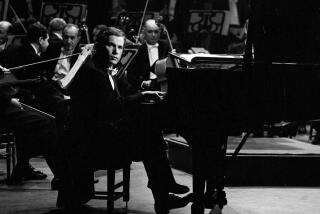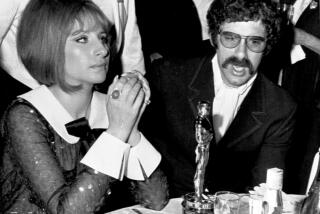Morton Gould; Composer, 82, Won Pulitzer, Kennedy Center Honors
Morton Gould, the prolific composer of All-American popular and classical music who published his first work at age 6 and earned a Pulitzer Prize and a Kennedy Center Honor as an octogenarian, died Wednesday in Orlando, Fla. He was 82.
Gould, who lived in Great Neck on New Yorkâs Long Island, died in his sleep while in Orlando to conduct seminars at Disney Institute, his family said. He had attended a concert of his compositions Tuesday night and received a standing ovation.
The eclectic composer of more than 1,000 works for radio, television, films, musicals, the ballet stage and the concert hall won his Pulitzer in music last year for âStringmusic,â commissioned by Mstislav Rostropovich for Washingtonâs National Symphony.
In 1994, Gould was one of five recipients of the Kennedy Center Honors, the highest award given by the United States to its artists. Tony Randall and the Army Concert Band offered âAn American Saluteâ at the Washington presentation, ending with fireworks reminiscent of Fourth of July concert pieces Gould composed and conducted across the country.
Gould also earned the recording industryâs highest award--a Grammy--for classical music in 1966, conducting the Chicago Symphony playing Charles Ivesâ Symphony No. 1 in D minor. Gould, who made more than 100 recordings, was nominated for the Grammy a dozen times. His conducting also won a Gold Baton from the American Symphony Orchestra League in 1983.
Respected by his peers across the entertainment palette, Gould was elected to the American Academy of Arts and Letters in 1986 and from 1986 to 1994 served as president of the American Society of Composers, Authors and Publishers.
âHonestly, I never thought of what my place is,â he told The Times in 1988 in answer to a question about his niche in American music. âI either am or I ainât, and thereâs not a damn thing I can do about it. Or anybody can do about it. It never occurred to me whether I, or anybody, will know who I am in a year from now. The fact is I am basically a composer-conductor, primarily a composer. But I would like to think of myself as a functioning--perhaps malfunctioning--musician.â
A familiar presence in Southern California during his long career, Gould was typically pragmatic when he arrived in Hollywood at age 31 to make the United Artists film âHigh Among the Stars.â At the time, his composition âSpirituals,â based on African American folk music from the South, was impressing audiences at the Hollywood Bowl.
âTake it or leave it, Morton Gould has made a place for himself in America,â wrote Times music editor Isabel Morse Jones prophetically that summer of 1944. âHe neither underestimates his ability nor overestimates his future. I predict Hollywood will have no visible effect upon him.â
Gould penned scores for such films as âDelightfully Dangerous,â âCinerama Holidayâ and âWindjammer.â
On the East Coast, he composed the music for Broadwayâs âBillion Dollar Babyâ in 1945 and âArms and the Girlâ in 1950.
One of his most notable commissioned works was the 1947 ballet about Lizzie Borden, âFall River Legend,â choreographed by the legendary Agnes de Mille. Gould made a buoyant recording of the suite, which incorporated Americana folk and hymnal themes.
Among his other commissions were âCheersâ for the Boston Symphony Orchestra in honor of Arthur Fiedlerâs 50th anniversary, and âAmerican Singâ for Placido Domingoâs performance at the 1984 Hollywood Bowl concert âGala Prelude to the Olympic Games.â
âGould certainly knows his way around high-class entertainment music,â stated Times music critic Martin Bernheimer. âThe âSingâ breaks no ground for profundity or originality. But it does offer an appealing argument for simple, slick, old-fashioned professionalism.â
Pointing out that Classical composers âwrote music to be used,â Gould espoused functionalism and communication of music, often with repetitive themes, throughout his career. âI grew up, like most other kids,â he once said, âon cowboy ballads, jazz, spirituals, carols, hot dogs, high school proms, vaudeville shows, band concerts in the park and all the rest of it. So it was natural for me to use that musical language when I began to compose.â
The child prodigy, whose Viennese grandmother had been a pianist, grew up in New York, writing music at the kitchen table. When he was 6, a teacher got his first composition published, titled âJust Six.â He won a scholarship to the New York Institute of Musical Art when he was 8 and studied at the New York University School of Music during high school.
Dropping out of school to help support his family, by age 17 he was earning his living playing piano in dance bands. He got a job as staff pianist with Radio City Music Hall and accompanied vaudeville acts at its 1932 opening, when he was 19.
By age 21 Gould was conducting and arranging his own weekly orchestral programs over the WOR-Mutual radio network. He often introduced his own compositions over Mutual and later CBS, earning a wide audience and opening up other avenues for his prolific talents.
âI do not look on movies, records and radio as penalties or deviations,â he told The Times in 1955. âThey are outlets--places where music can be used. I am only interested in developing myself to the fullest extent possible.â
When television grew, Gould embraced it as another outlet. His work for the small screen included music for the 1964 World War I documentary series, the special âF. Scott Fitzgerald in Hollywoodâ and the four-part 1978 miniseries âHolocaust.â He also was host of the National Educational Network series âThe World of Music With Morton Gould.â
He had recently composed a piece for saxophone for President Clinton and had presented it to him last month, said Gouldâs son David.
Gould is survived by another son, Eric; two daughters, Deborah Gould and Abby Burton, and eight grandchildren, all of the New York area.
More to Read
The biggest entertainment stories
Get our big stories about Hollywood, film, television, music, arts, culture and more right in your inbox as soon as they publish.
You may occasionally receive promotional content from the Los Angeles Times.










